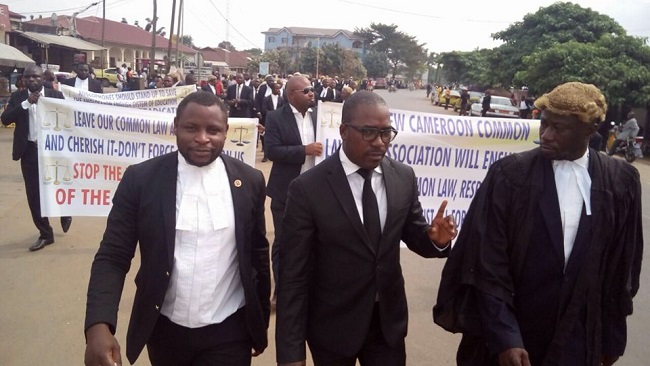“Take your Ego off the negotiating table” Barrister Agbor Balla tells Francophone representatives
Barrister Nkongho Felix Agbor has made public some of the reasons why he slammed the negotiations door with the Biya Francophone Beti Ewondo government. The human rights lawyer who is also the chairman of the Cameroon Common Law lawyers’ consortium said that the lawyers have asked the CPDM government to release with immediate effect all the children kidnapped in Bamenda and Kumba, who were transferred to Yaoundé Central Prison or the State Secretariat for Defense (SED). He added that negotiations could not be continued without these children being released.
Nkongho Felix Agbor told Nouvelle Expression newspaper that in a dialogue, the process must be a win-win situation “If we release the children, we can continue to dialogue.” According to him, no guarantees as to the safety and health of the young people arrested during the demonstrations in Bamenda were made available to the Anglophone lawyers. He said there was need for government agents to take off ego in this process.
The Chairman of the consortium noted that among the British Southern Cameroons children “that were arrested and taken to Yaoundé are some who are ill, are ill-treated.” Barrister Agbor Balla wondered aloud that “They were arrested in the South West and North West, what are they doing in Yaoundé in the Center region? When people demonstrate in Yaoundé and they are arrested, do they take them to Bamenda or Buea?
The Buea based lawyer also revealed that several other grievances made the meeting impossible. He hinted that “a strike was staged in the South West and North West. We are organizing a meeting in Yaoundé. The Commission is unbalanced. The head of the Commission is someone from Yaoundé; the Secretariat is run by a francophone. These are unacceptable things.”
According to Nkongho Felix Agbor, even if the CPDM government releases all detainees arrested in the North-West and South-West Regions, negotiations will only take place in Bamenda or Buea. The consortium has also announced that it will call for an independent commission of inquiry to shed light on the acts of violence perpetrated on citizens in Bamenda and Kumba. Concerning the thorny problem of federalism, he thinks it is important to discuss it. “Federalism,” he says, “is not secession.
By Soter Tarh Agbaw-Ebai






31/12/2016 @ 13:39
ACCORDS DE COOPÉRATION ENTRE LA FRANCE ET LE CAMEROUN: DÉJÀ 57 ANS
Signés le 26 DÉCEMBRE 1959 par le Président AHIDJO et la France du Président Charles de Gaulle.
Jusqu’à ce jour, ni Paul Biya, ni Georges Pompidou, ni Valéry Giscard d’Estaing, ni François Mitterrand, ni Jacques Chirac, ni même Nicolas Sarkozy ou François Hollande, n’y ont rien changé. Mais c’est l’article 6 qui suscite plus de curiosités.
LIRE
1- la France devra déterminer les choix politiques, économiques et socioculturels du Cameroun.
2- la France devra battre une monnaie pour le Cameroun, le FCFA
3- la France devra orienter la détermination des programmes scolaires du Cameroun à tous les niveaux
4- la France devra disposer dans son trésor public, d’un portefeuille appelé compte des opérations, de 100% des réserves de change du Cameroun.
NB : ce pourcentage a évolué en 1972 et 1973 respectivement à Brazzaville et Dakar pour la BEAC et l’UMOA, à 65% et finalement aujourd’hui il se situe à 50%.
5- les matières premières stratégiques du Cameroun devront être exploitées par la France en priorité. Si celles-ci n’est pas intéressée le Cameroun pourra trouver un autre partenaire où l’exploiter lui-même.
6- le 10 novembre 1961: l’assistance militaire. Chaque fois que le président camerounais sera débordé par une agression externe ou une rébellion Interne, il pourra faire appel à l’aide militaire de la France.
S’il n’est plus dans la capacité de le faire par un quelconque moyen de communication, l’ambassadeur de France au Cameroun peut le faire à la place de l’autorité camerounaise. Voilà les accords qu’un pays a signé…
En clair, nous ne sommes jamais sortis de la colonisation.
QUELLE HONTE!!!